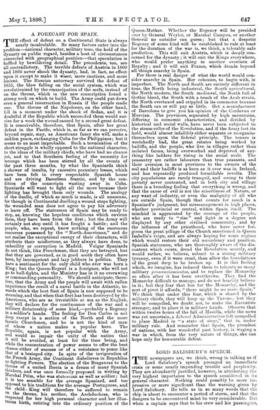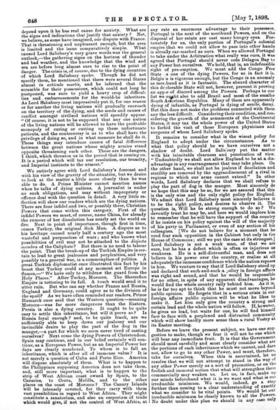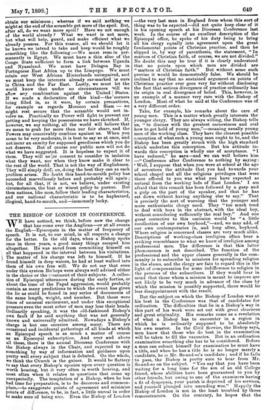LORD SALISBURY'S SPEECH. T HE newspapers are, we think, wrong in
talking as if Lord Salisbury's speech presaged an immediate crisis or some nearly impending trouble and perplexity. They are abundantly justified, however, in attributing the very highest importance to the speech considered in its general character. Nothing could possibly be more im- pressive or more significant than the warning given by Lord Salisbury. He tells us in so many words that the ship is about to encounter a period of storm, and that the dangers to be encountered must be very considerable. But when a captain says that to his crew and his passengers, depend upon it he has real cause for anxiety. What are the signs and indications that justify that anxiety ? Not, we believe, as some have imagined, our dispute with France.
That is threatening and unpleasant enough, but the area is limited and the issue comparatively simple. What caused Lord Salisbury's very grave words was the general outlook,—the gathering signs on the horizon of thunder and bad weather, and the knowledge that the wind and sea are before long almost sure to rise to the point of danger. The crisis is, of course, due to the dying countries of which Lord Salisbury spoke. Though he did not specify them, he mentioned that there were several States almost in articulo mortis, and he inferred that the scramble for their possessions, which could not long be postponed, was sure to yield a heavy crop of difficul- ties and , embarrassments for the would-be inheritors. As Lord Salisbury most impressively put it, for one reason or for another the living nations will gradually encroach on the territory of the dying, and the seeds and causes of conflict amongst civilised nations will speedily appear. " Of course, it is not to be supposed that any one nation of the living nations will be allowed to have the profitable monopoly of curing or cutting up these unfortunate patients, and the controversy is as to who shall have the privilege of doing so, and in what measure he shall do it. These things may introduce causes of fatal difference between the great nations whose mighty armies stand opposite threatening each other. These are the dangers, I think, which threaten us in the period that is coming on. It is a period which will tax our resolution, our tenacity, and Imperial instincts to the utmost."
We entirely agree with Lord Salisbury's forecast and with his view of the gravity of the situation, but we desire to look at the matter a little more closely than he was able to do. A Prime Minister cannot mention names when be talks of dying nations. A journalist is under no such obligations, and may without impropriety or offence deal with the question in detail. A very little re- flection will show our readers which are the dying nations. There are four infidel and two, or possibly three, Christian Powers that come within this category. First of the infidel Powers we must, of course, name China, for already the rumour of her dissolution has nearly set the world on ,fire. Next in point of importance, though first in time, comes Turkey, the original Sick Man. A dispute as to his heritage caused nearly half a century ago the most wasteful and purposeless of wars ; and who knows what possibilities of evil may not be attached to the disjecta Anembra of the Caliphate? But there is no need to labour .the point. That the break-up of the Turkish Empire is cer- tain to lead to great jealousies and perplexities, and very possibly to a general war, is a commonplace of politics. A great Turkish diplomatist once illustrated this fact by his boast that Turkey could at any moment set Europe in .flames,—" We have only to withdraw the guard from the Holy Places." After Turkey, Morocco. The Shereefian Empire is tottering to its fall. A touch would send it to utter ruin. But who can say whether France and Russia, England and Germany, could agree as to the division of the spoil? As we have often reminded our readers, Prince Bismarck once said that the Western question—meaning Morocco—was far more dangerous than the Eastern. Persia is also a dying country. It ought to be quite easy to settle this inheritance, but will it prove so ? Is Russia loyal enough ? and, to be quite frank, are we sufficiently able to keep down our jealousy and our invincible desire to play the part of the dog in the manger,—a part for which we seem never tired of casting ourselves? Next come the dying Powers of Christendom. Spain may continue, and in our belief certainly will con- tinue, as a European Power, but as an Imperial Power her days are clearly numbered. To whom is to fall an inheritance, which is after all of immense value ? It is not merely a question of Cuba and Porto Rico. America will dispose absolutely of them. What is to happen to the Philippines supposing America does not take them, and, still more important, what is to happen to the strip of West African coast owned by Spain, to the Canaries, to Ceuta, Melilla, and to the other places on the coast of Morocco ? The Canary Islands will be intensely coveted, for they carry with them vast possibilities in regard to West Africa. They might constitute a sanatorium, and also an emporium of trade which would give, if not the control of West Africa, at any rate an enormous advantage to their possessor. Portugal is the next of the moribund Powers, and on the disposal of her estate are cast many hungry eyes. For- tunately for us, the only portion of Portugal's colonial empire that we could not allow to pass into other hands is alreaay ear-marked as ours. When we allowed Portugal to take under the Arbitration what really was ours, it was agreed that Portugal should never cede Delagoa Bay to any Power but ourselves. We hold, that is, an indefeasible right of pre-emption. We must add the Congo Free State .s one of the dying Powers, for so in fact it is. Belgiu u is vigorous enough, but the Congo is an anomaly as rnor.bund as it is fantastic. The absurd character of this deplorable State will not, however, prevent it proving an appie of discord among the Powers. Perhaps to our list we oht also to add Brazil and most of the smaller South Aiierican Republics. Many of them are apparently dying of infantile, as Portugal is dying of senile, decay. But this does not make the problems connected with them any the less difficult. Considering their condition, and con- sidering the growth of the armaments of the Continental States, it may tax the whole power of the United States to forbid the visit of those European physicians and surgeons of whom Lord Salisbury spoke.
It remains to consider what is the wisest policy for England to adopt under the circumstances. As to what that policy should be we have ourselves not a shadow of doubt. Lord Salisbury put the matter with his inimitable clearness and penetration of view. "Undoubtedly we shall not allow England to be at a dis- advantage in any rearrangement that may take place. On the other hand, we shall not be jealous if desolation and sterility are removed by the aggrandisement of a rival in regions to which our arms cannot extend." In other words, Lord Salisbury declares that we shall refuse to play the part of dog in the manger. Most sincerely do we hope that this may be so, for we are assured that this is the only wise and the only right policy for England. We admit that Lord Salisbury most sincerely believes it to be the right policy, and desires to observe it. The question is, Will he be strong enough to do so ? We devoutly trust he may be, and here we would implore him to remember that he will have the support of the country if he insists on his policy against the will of the majority of his party in Parliament, or even of any section of his colleagues. [We do not believe for a moment that he need fear such opposition in the Cabinet but only in the House of Commons ; still we put the case at its strongest.] Lord Salisbury is not a weak man, of that we are sure, but he has a defect which is often as injurious as weakness. He is a self-distrustful man, and does not believe in his power over the country, or realise at all adequately the immense confidence which the nation reposes in him. We venture to say that if Lord Salisbury stood up and declared that such-and-such a ;Jolley in foreign affairs was right and sound, and that he would be responsible for no other, in spite of any apparent disadvantages, he would find the whole country rally behind him. As it is, he is far too apt to think that he must not move beyond public opinion. He forgets that in a serious crisis in our foreign affairs public opinion will be what he likes to make it. Let him only give the country a strong and certain lead and the whole nation will follow. If, however, he gives no lead, but waits for one, he will find himself face to face with a perplexed and distracted community which will show hardly more sense than a rural Vestry at its Easter meeting.
Before we leave the present subject, we have one sug- gestion to make, though we fear it will not be one which will bear any immediate fruit. It is that the Government should most carefully and most clearly consider what are the portions of each inheritance which we cannot, and dare not, allow to go to any other Power, and must, therefore, take for ourselves. When this is ascertained, let us resolve that we will not attempt to stand in the way of any other Power merely as a sort of precaution, or on the foolish and immoral notion that what will strengthen them commercially may weaken us. Let us, in fact, make up our minds beforehand what it is we want and what is our irreducible minimum. We would, indeed, go a step further than coming to a clear understanding of exactly what we consider to be vital points. We would let our irreducible minimum be clearly known to all the Powers. No doubt under this plan we should in any case only obtain our minimum ; whereas if we said nothing we might at the end of the scramble get more of the spoil. But, after all, do we want more spoil? Have we not enough of the world already? What we want is not more, but what will help, guard, and make efficient what we already possess. For this reason, all we should let it be known we intend to take and keep would be roughly something like the following :—We must rem in per- manently in Egypt. We must have a thin slice of the Congo State sufficient to form a link between Uganda and Nyasaland. We must have Delagoa Bay in Portuguese East Africa up to the Limpopo. We must retain our West African Hinterlands unimpaired, and we must keep the interests already ear-marked as ours in China and the Far East. Lastly, we must let the world know that under no circumstances ■vill we allow any combination against the United States. If we made a declaration of this kind—thel corners being filled in, as it were, by certain precautions, for example as regards Morocco and Siam — we might rest secure that the scramble would not in- volve us. Practically no Power will fight to prevent our getting and keeping the possessions we have sketched. If, however, we say nothing, all the world will believe that we mean to grab far more than our fair share, and the Powers may conceivably combine against us. When you mean to be very moderate, it is best to say so at once, and not incur an enmity for supposed greediness which you do not deserve. But of course our public men will not do what we have suggested. It is hopeless to expect it of them. They will ne-"ier consent to consider in isolation what they want, nor when they know make it clear to the rest of the world. That is not the way of Englishmen. They will simply drifi, on, doing the best they can as each problem arises. No doubt this hand-to-mouth policy has succeeded marvellously before and probably will again ; but, for all that, if is not, we believe, under existing circumstances, the best or wisest policy to pursue. But then nations, like men, follow their leading characteristics, and our national characteristic is to be haphazard, illogical, hand-to-mouth, and—immensely lucky.








































 Previous page
Previous page